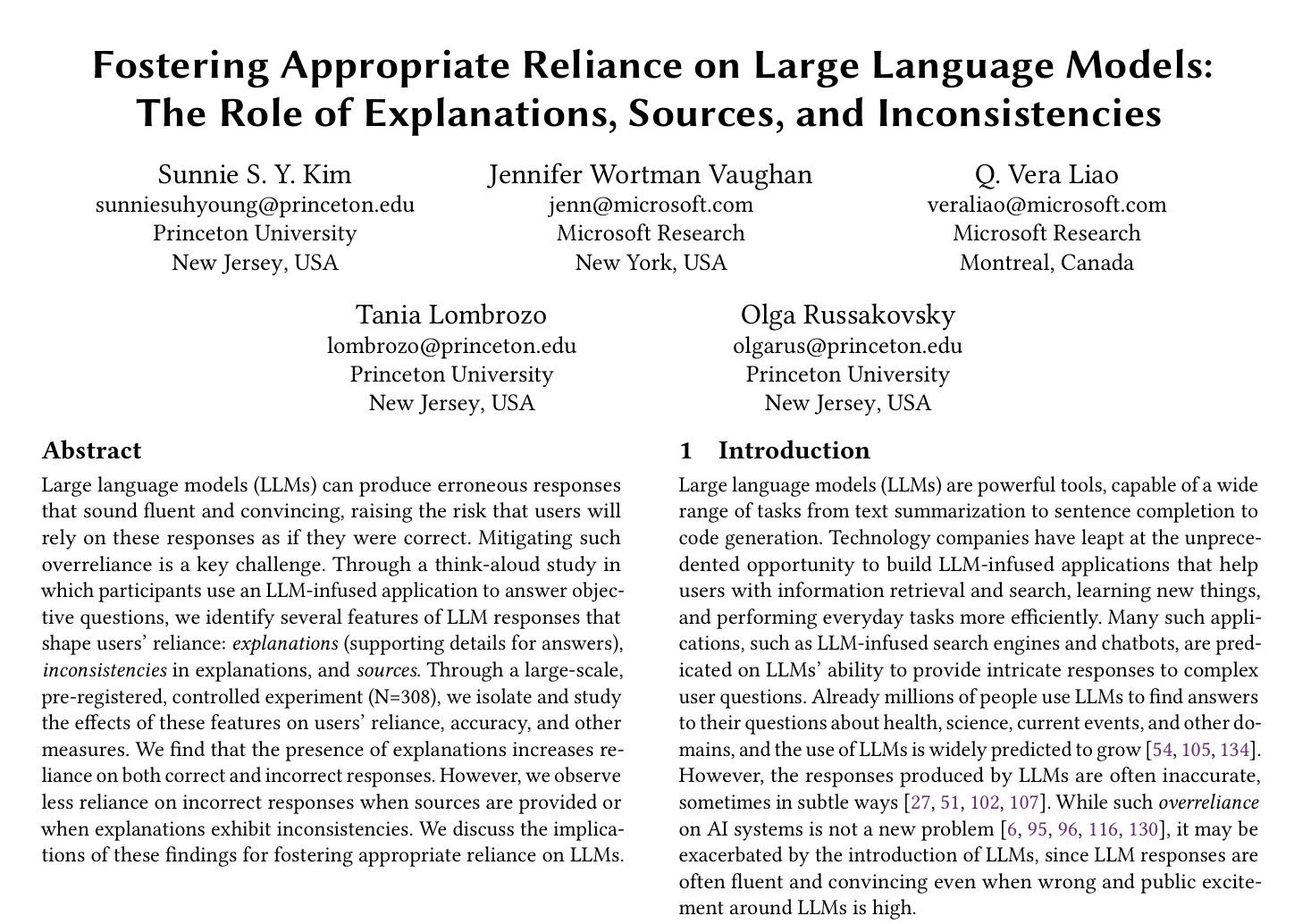Appropriate reliance is key to safe and successful user interactions with LLMs. But what shapes user reliance on LLMs, and how can we foster appropriate reliance?
In our #CHI2025 paper, we explore these questions through two user studies.
1/7
@jenn @qveraliao @PrincetonCS @hci @citp
"Fostering Appropriate Reliance on LLMs" received an Honorable Mention at #CHI2025
This work is also the last chapter of my dissertation, so the recognition feels more special🏅🎓😊
🎉 to the team!!!
Appropriate reliance is key to safe and successful user interactions with LLMs. But what shapes user reliance on LLMs, and how can we foster appropriate reliance?
In our #CHI2025 paper, we explore these questions through two user studies.
1/7
As #AI gains a growing space in creation and art, how are the public discourses on AI in the arts shaping creative work?
It what we investigate in a new paper with @Katecrawford, @qveraliao, Gonzalo Ramos and Jenny Williams: arxiv.org/abs/2502.03940
🧵 [1/n]
All AI systems make mistakes.
🧐 What if users could leverage AI flaws to understand it & take informed actions?
🚀 Our #CSCW2024 paper on Seamful XAI offers a process to foresee, locate, & leverage AI flaws—boosting user understanding & agency.
📜 https://arxiv.org/pdf/2211.06753
But why should you care?⤵️
1/n
w/ @Riedl @hal Samir Passi @qveraliao #academia #HCI
New paper to share! 📣 @qveraliao and I lay out our vision of a human-centered research roadmap for “AI Transparency in the Age of LLMs.”
https://arxiv.org/abs/2306.01941
There's lots of talk about the responsible development and deployment of LLMs, but transparency (including model reporting, explanations, uncertainty communication, and more) is often missing from this discourse.
We hope this framing will spark more discussion and research.
Attempting my first mastodon thread below... 🧵
The rise of powerful large language models (LLMs) brings about tremendous opportunities for innovation but also looming risks for individuals and society at large. We have reached a pivotal moment for ensuring that LLMs and LLM-infused applications are developed and deployed responsibly. However, a central pillar of responsible AI -- transparency -- is largely missing from the current discourse around LLMs. It is paramount to pursue new approaches to provide transparency for LLMs, and years of research at the intersection of AI and human-computer interaction (HCI) highlight that we must do so with a human-centered perspective: Transparency is fundamentally about supporting appropriate human understanding, and this understanding is sought by different stakeholders with different goals in different contexts. In this new era of LLMs, we must develop and design approaches to transparency by considering the needs of stakeholders in the emerging LLM ecosystem, the novel types of LLM-infused applications being built, and the new usage patterns and challenges around LLMs, all while building on lessons learned about how people process, interact with, and make use of information. We reflect on the unique challenges that arise in providing transparency for LLMs, along with lessons learned from HCI and responsible AI research that has taken a human-centered perspective on AI transparency. We then lay out four common approaches that the community has taken to achieve transparency -- model reporting, publishing evaluation results, providing explanations, and communicating uncertainty -- and call out open questions around how these approaches may or may not be applied to LLMs. We hope this provides a starting point for discussion and a useful roadmap for future research.
Join the 2nd Explainable AI for CV (XAI4CV) workshop at #CVPR2023!
https://xai4cv.github.io/workshop_cvpr23
👥 The workshop will take place on June 19th in Vancouver, Canada. More to follow on in-person/hybrid setup
🎤 We have a fantastic line-up of speakers: @qveraliao, Mohit Bansal, Marina M.-C. Höhne (née Vidovic), @arvind, Alice Xiang, and @davidbau
📄 Submit papers and demos by March 14th (proceedings track) and May 19th (non-proceedings track)
We are accepting applications for a postdoc job with us at MSR in Cambridge MA. Super sweet gig, link to apply is here
Apply for Post Doc Researcher – Socio-Technical Systems – Microsoft Research job with Microsoft in Cambridge, Massachusetts, United States. Research, Applied, & Data Sciences at Microsoft
